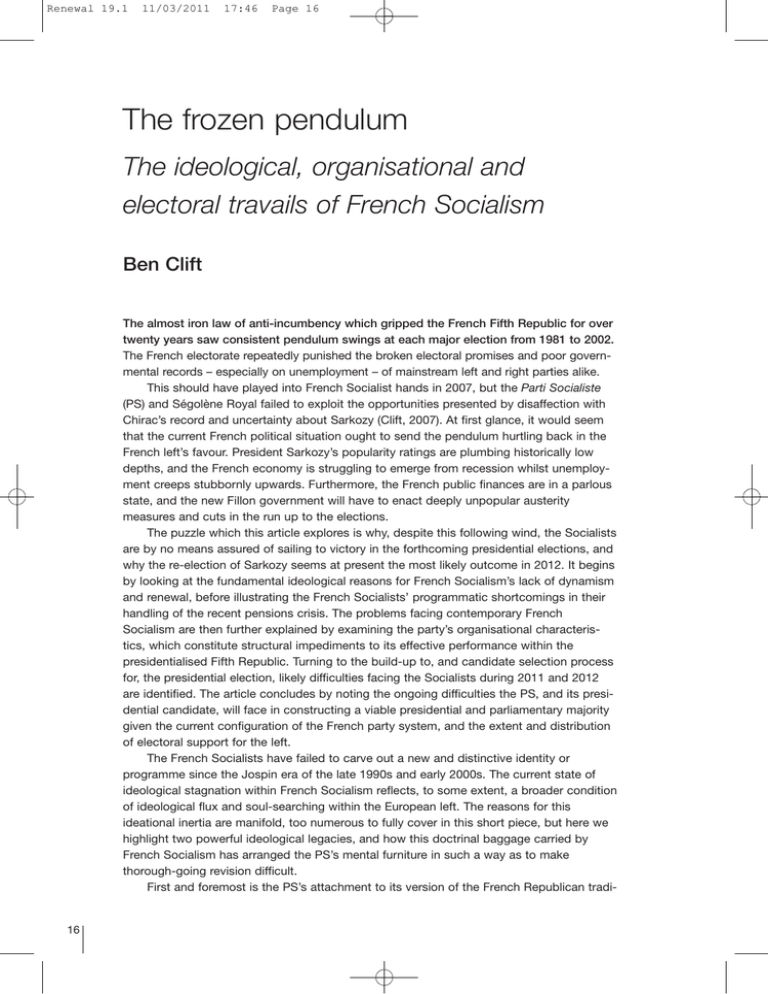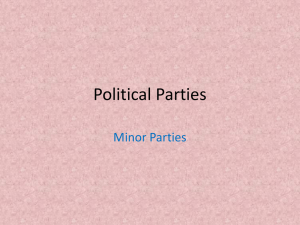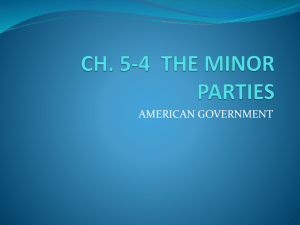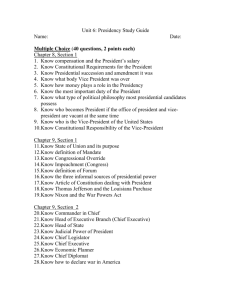The frozen pendulum The ideological, organisational and electoral travails of French Socialism
advertisement

Renewal 19.1 11/03/2011 17:46 Page 16 The frozen pendulum The ideological, organisational and electoral travails of French Socialism Ben Clift The almost iron law of anti-incumbency which gripped the French Fifth Republic for over twenty years saw consistent pendulum swings at each major election from 1981 to 2002. The French electorate repeatedly punished the broken electoral promises and poor governmental records – especially on unemployment – of mainstream left and right parties alike. This should have played into French Socialist hands in 2007, but the Parti Socialiste (PS) and Ségolène Royal failed to exploit the opportunities presented by disaffection with Chirac’s record and uncertainty about Sarkozy (Clift, 2007). At first glance, it would seem that the current French political situation ought to send the pendulum hurtling back in the French left’s favour. President Sarkozy’s popularity ratings are plumbing historically low depths, and the French economy is struggling to emerge from recession whilst unemployment creeps stubbornly upwards. Furthermore, the French public finances are in a parlous state, and the new Fillon government will have to enact deeply unpopular austerity measures and cuts in the run up to the elections. The puzzle which this article explores is why, despite this following wind, the Socialists are by no means assured of sailing to victory in the forthcoming presidential elections, and why the re-election of Sarkozy seems at present the most likely outcome in 2012. It begins by looking at the fundamental ideological reasons for French Socialism’s lack of dynamism and renewal, before illustrating the French Socialists’ programmatic shortcomings in their handling of the recent pensions crisis. The problems facing contemporary French Socialism are then further explained by examining the party’s organisational characteristics, which constitute structural impediments to its effective performance within the presidentialised Fifth Republic. Turning to the build-up to, and candidate selection process for, the presidential election, likely difficulties facing the Socialists during 2011 and 2012 are identified. The article concludes by noting the ongoing difficulties the PS, and its presidential candidate, will face in constructing a viable presidential and parliamentary majority given the current configuration of the French party system, and the extent and distribution of electoral support for the left. The French Socialists have failed to carve out a new and distinctive identity or programme since the Jospin era of the late 1990s and early 2000s. The current state of ideological stagnation within French Socialism reflects, to some extent, a broader condition of ideological flux and soul-searching within the European left. The reasons for this ideational inertia are manifold, too numerous to fully cover in this short piece, but here we highlight two powerful ideological legacies, and how this doctrinal baggage carried by French Socialism has arranged the PS’s mental furniture in such a way as to make thorough-going revision difficult. First and foremost is the PS’s attachment to its version of the French Republican tradi- 16 Renewal 19.1 11/03/2011 17:46 Page 17 Features changing fortunes of social democracy tion, and secondly its reliance on the political economy of Keynesianism. Both these frames of reference weigh heavily on the party’s ideology, establishing programmatic parameters that successive leaders and party conference texts have not transcended. Considering recent French Socialist discourse and practice, the lack of innovation in political and economic strategy is striking. Equally notable is the unrealistic nature of many positions and proposals espoused by the French Socialists, especially whilst in opposition, as they have been since 2002. The constant reference to the French Republican tradition explains another curious facet of French Socialist thinking. Despite a strong ideological commitment to internationalism, written into the party’s statutes, recent party texts – like so many before them – offer a singularly France-centric account of the problems facing international society and possible solutions to them. PS internationalism always entails a Republican ‘civilising mission’ trying to make the rest of Europe, or the world, more like France. A recurrent theme within French Socialist discourse and texts is the unrealistic re-describing and reimagining of the international and European order along very French lines. This is scarcely a viable, practicable or credible position from which to pursue an internationalist, or internationalising agenda. Yet there is at best limited recognition of the collective action problems such a French vision faces in attempting to transform the European or wider international political economy. Thus, for example, the French Socialist vision for ‘Social Europe’ remains very closely modelled on the PS’s own idealised selfimage of French welfare institutions and labour market practices. French Socialists also seek to re-constitute European economic governance along the lines of an ‘economic government’ – consistent with the Republican statist tradition wherein state intervention in economic activity is the ‘guiding force’, providing capitalism with the necessary direction (Jospin, 1999, 2001). Both have gone unrealised since the 1980s because of the unenthusiastic responses of European partners. These aspects of PS identity and thinking betray a methodological nationalism which is hard-wired into French Socialist, and more broadly into European social democratic, thought and action. This is amply illustrated in the PS texts on the international and European order, and on ‘real equality’, which were adopted following its October and December 2010 conventions (PS, 2010a, 2010b). This national perspective characterised the political economy of social democracy as a political movement throughout the twentieth century, but the failure to ‘move beyond the national’ in convincing fashion is an important source of the problems facing social democratic ideological renewal in the twenty-first century (see Gamble, 2009; Ferrera, 2005, 2009). French Socialism and the French Republican tradition In France, methodological nationalism is so deeply entrenched partly because of French Socialism’s reliance for programmatic inspiration on a particular reading of the French Republican tradition. What Jack Hayward calls the contested ‘normative legacy’ of the revolutionary decade of 1789-99 has shaped French political ideologies and state-society relations ever since (Hayward, 2007). The national founding and legitimising myth of the French Revolution continues to frame French Socialist politics today. In a telling rhetorical ploy, when Jospin outlined his core values in 1995, he described them not as Socialist, but as Republican: Liberty, equality of opportunity and rights for all, the impartiality of the state, secularism, security, and a fair balance between individual and collective interest, national 17 Renewal 19.1 11/03/2011 17:46 Page 18 RENEWAL Vol 19 No. 1 solidarity between generations and regions. The French must convince themselves that our Republic’s values retain their mobilising force. (Jospin, 1995, 41) The importance of equality to French Socialism, and to French Republican ideology, is perhaps the most powerful ‘normative legacy’ of the French Revolution. Within French Socialism throughout the twentieth and now into the twenty-first century, Jean Jaurès’s interpretation of the Republican tradition has been powerfully influential. Jaurès saw 1789 as but the first step towards a true republic, laying the political foundations, but leaving French socialists the task of translating political equality (before the law) into a more thorough-going social equality (of condition). The role of the state, as the embodiment of the Republic, in this egalitarian mission was unquestioned: extending liberty, fraternity and equality from the political domain to the spheres of society and production. Thus the egalitarian element in French Socialism has always been couched in Republican terms, with a resultant statist approach not just to equality of opportunity, but also to greater equality of material conditions. Within French Socialism, this particular brand of Republicanism still influences attitudes towards the institutions of the French State (PS, 2010b). In the contemporary context, the emergent French Socialist project for the 2012 presidential elections has been built around the notion of ‘real equality’. This central organising theme obviously chimes with this politically powerful Republican discourse – indeed it is discussed interchangeably as ‘Republican equality’ (PS, 2010b). However, such rhetoric jars with the reality of the welfare state and social policy in France. Jack Hayward describes the Republic as a ‘resonantly hollow shell’, nowhere more so than in relation to equality (Hayward, 2007, 343). Outcomes for sizeable sections of the French population, including the urban poor living in run-down suburbs, many second and third generation immigrants, young people in the labour market, and the rural poor, do not chime with this notion of real equality. Supposedly one of the Republic’s core values, French political discourse evokes and proclaims egalitarianism frequently – but the ability of French public policy to deliver it is limited and inconsistent. Hayward portrays France’s ‘indivisible’ Republic as but a ‘superimposition of a spurious unity on an empirical plurality’ (2007, 67), wherein ‘nominal equality is contradicted by a multitude of increasing inequalities’ (2007, 372). Obviously, ‘real equality’ has been developed as a stick to beat Sarkozy with, and it may serve that purpose. But the uncomfortable truth is that successive Socialist governments of the 1980s, 1990s and early 2000s failed to successfully address these issues and deliver on egalitarian commitments to all sections of the population. The problem lies partly in how the appeal to French Republican political tradition gets evoked by successive generations of French Socialist elites. It lends itself more to vague but evocative grand-standing visions of society, rhetorical flourishes and rallying cries than it does to practical, detailed policy measures. So too with the PS texts of 2010 – which make vague, uncosted promises and contain few new ideas and prosaic policy initiatives. The irony, then, is that France’s particular cultural and ideological heritage gives the Socialists much greater licence to talk in terms of egalitarianism than is the case in some other European nations. Yet, ‘on the ground’ the record of French Socialists in delivering egalitarianism in office is patchy at best. In terms of aggregate social spending France approaches Nordic levels. However, in terms of egalitarian outcomes in economic, social and labour market policy, France consistently falls a long way short of Scandinavian social democratic achievements. 18 Renewal 19.1 11/03/2011 17:46 Page 19 Features changing fortunes of social democracy Keynes lives! … in Paris French Socialist analysis of France’s economic problems, and in particular proposed solutions to long-standing high unemployment, has always had a distinctly Keynesian flavour. The focus is on boosting the purchasing power of the poorer members of society by attempting to redistribute wealth to them by various means, notably progressive taxation and wages policy. This ‘crisis of under-consumption’ analysis is less pronounced today than in the Keynesian heyday of the Mitterrand experiment between 1981 and 1983 (Hall, 1986), but a broadly Keynesian vision still underpins French Socialist economic strategy and its critique of financialisation and neo-liberal capitalism (PS, 2010b, 4-5, 23-4). The PS has always appealed first and foremost to national-level Keynesianism, at times supplemented with a desire to reshape the European political economy (along French lines) and infuse it with a Keynesian spirit. As the Mitterrand experiment demonstrated, national-level Keynesianism in an open economy is problematic. Yet international or supra-national Keynesianism faces still greater obstacles. Keynes’s original idea of internationalised Keynesianism sustained through the Clearing Union, central to his initial draft proposals at Bretton Woods, was still-born (Best, 2005, 39-45). Only a staunchly national version of Keynesianism emerged, and within the modus operandi of the Bretton Woods institutions, economic adjustment burdens fell on debtors, not on creditors (as Keynes had hoped). The variant of Keynesianism pursued under Bretton Woods was ‘hollowed out’ over time, its progressive credentials slowly undermined (Best, 2005). Thus, even when that very rare and unlikely set of international pre-conditions permitting the establishment of Bretton Woods did emerge, the ability to deliver on egalitarianism via Keynesian political economy was limited to a very small number of countries, and limited in how fully that strategy could be prosecuted in those few countries. Nevertheless, the French Socialist international and European reform agenda has consistently sought the reinvigoration of international Keynesianism, and the establishment of a ‘new Bretton Woods’. So it was once again in their October 2010 convention text on a new international and European order (PS, 2010a, 12-15). As a strategy for the renewal of the future of social democracy, the appeal for a new Bretton Woods is profoundly misguided, because international political economic conditions have evolved so as to make such a scenario implausible. Supra-national or global Keynesianism is not a realistic option. For all its commitment to internationalism, and lengthy periods of reflection on international issues, the PS has never convincingly mounted a search for a way of living with capitalism that goes beyond the national level. It either calls for bold but unrealistic reforms to the UN or Bretton Woods institutions (in the French image), or it restates Tobin tax style proposals. The French Socialists have long clung to the notion that their Keynesian aspirations could be realised at the EU level (Clift, 2003b; PS, 2010a). This was unrealistic even before the current fiscal crisis and sovereign debt concerns of the eurozone. In its wake it looks entirely fanciful. Social democracy has always been about living with capitalism. This entails coping with capitalism’s inherent instabilities and their social consequences. In particular, managing the growing inequalities associated with capitalism is a particular concern to social democrats animated by a concern for equality. Faced with today’s harsh global and European climate for social democracy, the French left needs to develop a new and viable theory of the state and intervention in the economy outside the Keynesian paradigm. Its governing philosophy needs to face up to contemporary capitalist conditions, and set out novel rationales for, and logics of, intervention. 19 Renewal 19.1 11/03/2011 17:46 Page 20 RENEWAL Vol 19 No. 1 This is the kind of thinking which has the potential to ‘post-nationalise’ social democracy. Such a ‘moving beyond the national’ is sorely needed (Gamble, 2009), but the French Socialists, like other social democrats, find it very difficult – because of their ideological and institutional legacies – to achieve. To date, there is little indication that the PS is even attempting such a post-national, non-Keynesian re-boot of its programmatic and ideological output. The 2010 pensions crisis and the battle for the Socialist presidential candidacy The lack of innovation and realism in international and domestic macroeconomic policy is also reflected in social policy. This was demonstrated in the PS’s handling of the pensions crisis of September/October 2010 – which saw millions take to French streets over many weeks of demonstrations in protest at Sarkozy’s proposed reforms. At heart, the Socialist critique of Sarkozy’s pensions proposals lacked credibility. Partly, as detailed below, their stance tended not to fully recognise the problem’s gravity nor address its causes and consequences. Moreover, their main line of argument was about the modus operandi of pension reform. Sarkozy’s hyperactive, macho, abrupt governing style forced the pace of reform, eschewing extensive negotiation with social partners. Public outcry from the trade unions was rooted in a sense that the reform had been imposed upon them hastily and without adequate consultation, both when first introduced in July, and when voted on in parliament in September/October. This absence of negotiation is unusual, since historically the structure of the French pensions system required full negotiation with, and the acquiescence of, social partners. The problem with attacking Sarkozy on these grounds, from the PS perspective, is that the PS itself is historically and structurally very weakly embedded within social movements generally and the trade union movement in particular. This made such criticism ring rather hollow, hindering the PS’s ability to capitalise effectively on the pensions crisis in 2010. Supposedly, the French pensions system is the embodiment of French Republicanism, but looked at up close, it is byzantine in its complexity and neither egalitarian nor universal – comprising as it does hundreds of different regimes with different levels of provision and treatment. The truth, regarding the French system and welfare provision more broadly, is that coverage and provision is very generous for some, but by no means all. The other compelling fact about both is that the French welfare state is extremely expensive. Decades of ‘passive’ labour market reform introduced by Socialist and other governments, offering early retirement to large numbers of ‘victims’ of economic restructuring, have only exacerbated these funding problems. The Socialists are particularly culpable, having lowered the pension age in 1982. All of this has added hugely to French welfare bills whilst taking potentially active citizens (and their tax revenues) out of the labour market. Such measures are now widely seen as an unaffordable luxury, especially given France’s debt and deficit situation. Thus many French people on one level accept (somewhat grudgingly) the need for pension reform, given the context of France’s demography and public finances. Demographically, reforming the public pension system makes sense given that pensioner numbers are set to increase rapidly from 15 million in 2008 to nearly 23 million in 2050, with the estimated ratio of economically active to retirees likely to drop from 1.7 today to 1.2. French public debt, already above 60 per cent of GDP in the mid-2000s, rose sharply following the global economic crisis and resulting costly fiscal stimulus packages, reaching 71.9 per cent in 2009. French deficit levels also rose from 3.3 per cent in 2008 to 7.7 per 20 Renewal 19.1 11/03/2011 17:46 Page 21 Features changing fortunes of social democracy cent in 2010. The expensive French pension system plays an important role in France’s debt and deficit. Estimates of the public sector pension deficit stood at €32bn or 1.7 per cent of GDP in 2010. The key point is that, even with the 2010 Sarkozy reforms enacted, this proportion is likely to increase between 2015 and 2020. Thus the reform decried by Socialists as beyond the pale is in effect only a palliative making the French public finances deteriorate at a less rapid rate for the next ten years. Under such conditions, there would be scope for the French Socialists to carve out a reforming agenda for French pensions which addresses the need to rebalance the financing of the system, but also seeks to reorient its delivery in a more egalitarian direction. Yet Socialists wrapped the pensions issue up in the Republican flag, asserting that reforming the pensions system constituted an offence against Republican social rights which, supposedly, the French welfare state institutionalises. One reason why this opportunity was missed is that the preamble to the Socialist primaries (to choose the 2012 presidential candidate) was beginning in September 2010, leading key players to jockey for distinctive and headline-grabbing positions amidst the pension crisis. Each presidential hopeful sought to score points off Sarkozy by arguing that pension reform constituted an assault on French Republican values, misguidedly assuming the current system to be a paragon of egalitarian virtue. The various contenders attempted to carve out subtly different stances as part of their positioning in the drole de guerre of PS primaries, scheduled for mid-to-late 2011. Ségolène Royal’s opportunistic commitment to reverse the pension reform if elected betrayed a lack of serious engagement with the demographic and fiscal issues at stake. Martine Aubry was committed to retaining the sixty-year retirement age, but requiring 41.5 years of contribution to receive a full pension, at least beginning to recognise the necessity of tackling funding shortfalls. Dominique Strauss-Kahn, the centre-left IMF Managing Director, went a little further, albeit in a mealy-mouthed fashion, arguing that retention of retirement at sixty ‘should not be a dogma’ for the Socialists. Each of them failed to grasp the nettle of the demographic and financial predicament of French pensions. None sought reform of the current system set against the yardstick of egalitarianism. The lack of realism in much PS positioning on pensions provoked some moderate centre-left figures, who constitute the right wing within the PS, to reassert a commitment to ‘left realism’, an idea developed by Jospin in the 1990s (Clift, 2003a). For these social democrats, such as Manuel Valls and former party leader Francois Hollande, this ‘realism’ necessitates some reformulation of core Socialist values. Within the pensions debate, this entailed a recognition of the need for longer contribution periods, and an acceptance of a later retirement age. This was more in tune with the realism of the French populace, but it was and is a very marginal outlier position within a PS still anchored staunchly on left as opposed to centre-left political terrain. The PS centre-left retains a commitment to redistribution, but its policy approach accepts that, in order to be credible, French Socialism’s underlying egalitarianism needs to become more modest in its ambitions. This act of ideological positioning, like all the others within the PS at present, is taking place against the backdrop of the electoral timetable leading up to 2012. Valls, and especially Hollande, are looking to occupy any moderate social democratic political space in the party (if such a thing exists). This is partly in anticipation that Strauss-Kahn may decide not to run. In such an eventuality, Hollande will most likely stand in the primaries in defence of a centre-left ideological standpoint. 21 Renewal 19.1 11/03/2011 17:46 Page 22 RENEWAL Vol 19 No. 1 A presidential party? So, in programmatic and ideological terms, the French Socialists are faced with ossified positions and stultified debate. Furthermore, in 2010 they were not adept at engaging in the public policy debate in a way which landed significant blows on Sarkozy’s deeply unpopular presidency. Unfortunately for the PS, as it attempts to mobilise ahead of 2012, the organisational predicament of French Socialism is not much more encouraging. The PS is a curious ‘presidential’ party. It has been operating since its refoundation in 1969 in a political system organised around presidentialism, yet its structures and statutes remain strangely ill-suited to selecting and supporting presidential candidates. A cursory look at the party’s history lays bare the dysfunctionalities of the PS as a recruiting and training ground for future presidents. Scores of mid-level ‘elephants’ (as the party unflatteringly refers to its bigger beasts) occupy their seats of power within the party, and enjoy the support of their respective divisions – but very few transcend the party to establish national appeal. If anything, the presidentialised factionalism of the party’s structure, institutionalised through internal proportional representation, actively undermines the ability to select and align behind a single candidate. Michel Rocard, one of the few plausible candidates, had his presidential ambitions torpedoed by bitter infighting between competing PS factions – his Rocardians were at war with the Mitterrandists from the 1970s till the 1990s. This experience probably warned off other promising candidates such as Jacques Delors. It may yet warn off Dominique Strauss-Kahn, too. Arguably, in its forty-year history, the PS has managed but one genuinely credible and compelling candidate – President Mitterrand. Yet even he came from outside the party and effectively took it over by putsch at the Epinay conference of 1971, so PS internal selection procedures can take no credit for his designation. Since then, the PS has recruited scores of effective mayors, parliamentarians and ministers, even some capable prime ministers, such as Mauroy and Jospin. But it has not come up with another presidential candidate to match Mitterrand, the only Socialist President to date in the fifty-two years of the Fifth Republic. This is clearly a substantial failing on the part of one of only two presidential parties in the French political system. The current consequence of this internal failing is a decidedly unbalanced French democracy (Balme, 2006, 249-50; Grunberg and Haegel, 2007). Nor, over the last forty years, has the PS come up with an internal organisational structure or process to prevent open warfare breaking out between the rival camps of presidential hopefuls in the run-up to each presidential election. So, in all probability, it will be again in the run-up to 2012. In an unsatisfactory bid to surmount these organisational obstacles, two of the key protagonists – party leader Martine Aubry and likely presidential contender-in-waiting Dominique Strauss-Kahn – have reportedly signed a non-aggression pact. During 2010, the party set an autumn 2011 timeframe for its primaries. Until then, Aubry is trying ‘not to mention the war’ – avoiding discussion of or decisive action on presidential candidate selection while Strauss-Kahn deliberates on whether or not to run. This uneasy peace is fuelling uncertainty and tension and gnawing away at the party’s limited resources of cohesion. This situation particularly irks all those who want to avoid a Strauss-Kahn presidential candidacy (fearing him to be too centrist). The other pretenders to the throne are calling, not unreasonably, for the decision-time to be brought forwards. The ill-will and bad blood created in the first half of 2011 will doubtless make rallying behind the eventual candidate all the more difficult. These troubled internal politics of the party are compounded by the fact that, in programmatic terms, the PS fails to grasp the logic of the presidential system within which 22 Renewal 19.1 11/03/2011 17:46 Page 23 Features changing fortunes of social democracy it operates. This time, as in 2007, the party is spending the year or two leading up to the presidential election busily forging new programmatic texts. During 2010, a series of four party conventions, culminating in the ‘real equality’ convention in December 2010, again set out the PS’s stall (1). As before, the PS hopes to impose this programmatic and ideological line on their as yet undetermined presidential candidate. Yet in a presidential system, successful candidates require relative autonomy from ‘their’ party, and their campaign and programme must have a personal quality (Clift, 2005). The PS text drafted in 2006 for the 2007 presidential elections was nothing but a millstone around Ségolène Royal’s neck as presidential candidate. Her departures from it attracted the ire of senior party figures who were sniping from the sidelines, apparently thinking they were still operating in a party-dominated parliamentary political system which disappeared in 1958 (or more accurately 1962). A similar scenario could re-emerge in 2011-12. Key left-wing figures such as party spokesperson Benoit Hamon, with Aubry’s backing, have navigated agreement on a new party text which is typically vague, but contains a series of positional statements and commitments designed to anchor the PS’s political centre of gravity significantly to the left. This is partly designed to make Aubry’s candidacy more likely, and to scare off the more centrist Strauss-Kahn. Yet Strauss-Kahn is by far the best placed potential candidate in public opinion terms – both amongst PS supporters (where a January 2011 poll placed him at 47 per cent, Hollande at 18 per cent and Aubry at 12 per cent (IFOP, 2011)) – and within the wider French electorate. Other potential candidates include Ségolène Royal, and – more remote prospects – modernisers like Manuel Valls and Arnaud Montebourg. A November 2010 IFOP poll assessed the likelihood to win and presidential qualities of potential left candidates Martine Aubry, Ségolène Royale and Francois Hollande. None of them polled above 15 per cent on each question. Aubry as head of the party would like to emerge seamlessly as the ‘natural’ Socialist candidate – but she struggles to come across as a naturally presidential politician. At the time of writing, Strauss-Kahn appears to be the only PS potential candidate well enough placed in public opinion to be a successful contender in 2012. The November IFOP poll ranked him streets ahead of the others, scoring 52 per cent both on likelihood to win and presidential qualities (IFOP, 2010). Yet, as noted above, many within the party are moving hell and high water to put him off standing. Heaven forefend the PS should select a candidate who might stand a fighting chance of beating Sarkozy! For these and other reasons, Strauss-Kahn may well not run, leaving the PS facing an uphill struggle towards 2012. If Strauss-Kahn does not run, the French Socialists may waste the opportunity of 2012. The possible paucity of French Socialist opposition to Sarkozy in 2012 is all the more galling because of how spectacularly and record-breakingly unpopular the President has made himself. The combination of his brusque political style, ill-judged decisions, and some unpalatable reforms, has put French voters off. To give but two recent examples, amidst announcements of austerity measures and the need for belt-tightening in the national interest given France’s public finances, Sarkozy unveiled what has been ridiculed as ‘Air Sarko One’, his brand new €176m luxury presidential jet. This was seen as symbolic of his taste for ‘bling’, and was particularly hard to stomach as austerity is foisted upon the French middle and lower classes in particular. During the summer of 2010, there was also Sarkozy’s crass targeting of the Roma amidst harder-line security and immigration policies, which attracted international opprobrium and legal rebuke from the EU. The combination of the French president’s historically low approval ratings and these gargantuan gaffes should encourage the PS’s electoral resurgence, but to date precious little headway has been made. 23 Renewal 19.1 11/03/2011 17:46 Page 24 RENEWAL Vol 19 No. 1 Conclusion We began by noting the lack of renewal within French Socialist ideology, explained by the strength of attachment to a particular reading of the French Republican tradition, and to Keynesian tenets of political economy. This ideological inertia is compounded by the organisational and structural idiosyncrasies of the PS. What is striking is how little has changed – programmatically or ideologically – within the PS since the end of the Mitterrand era. The old factions have ebbed and flowed and subtly changed form – but effectively the same clans, and the same rhetorical flourishes which are the expression of their ideological differentiation, remain. The long-standing leftright cleavage within the party endures, with the party’s centre of gravity rooted on the left, and more centrist social democratic elements still viewed with considerable suspicion. The current French Socialist elite have also struggled to carve out an effective and credible critical voice in opposition. This all helps to explain the PS’s disconcerting failure to capitalise on the French President’s woes to date. What is more, even if the PS were able to surf a wave of anti-Sarkozyisme, it is highly unlikely that that sentiment alone would be powerful enough to sweep the French Socialists into office. The tide of anti-Sarkozy feeling may ebb and recede between now and April 2012. The PS needs a credible – and costed – alternative programme for France. Yet this is just the kind of thing that the norms of intellectual production in the PS – in opposition in particular – are rather ill-suited to delivering. Internal power-politicking (and PS texts are always the battleground for that) is again taking precedence over national political issues – such as carving out a viable and practicable governing alternative to Sarkozy. The December 2010 ‘real equality’ text is a case in point. Vague rhetorical flourishes abound, but precise and concrete reform proposals for economic and social policy are in rather short supply. There are numerous vague and uncosted (but doubtless extremely costly) propositions – such as improving the quality of French university education to meet the standards in the grandes écoles. There is at best only oblique and very cursory recognition of the parlous state of French public finances – and its implications for the limits of the possible for future Socialist economic and social policy. There is also very little in the 2010 texts on key issues of growth, employment, and social protection. As noted above, PS positions on pension reform did not present an alternative systemic reform which grasped the nettle of the demographic, actuarial and economic challenges facing French public pensions. Perhaps an even bigger problem for the French Socialists – over and above its sizeable problems of internal ideological and organisational stasis – is the current configuration of the wider French left within the French party system, and the spread of political and electoral support across it. In short, since the demise of the French Communists, the level of support for the whole of the French left has diminished somewhat – to the extent that it is not certain that the potential exists to forge a governing electoral majority of the left in France today. It is clear that the PS cannot do this alone – and therefore the PS (and ‘its’ presidential candidate) will need to extend their appeal beyond the party to the French left, and its voters, more widely. The problem here is that a sharp schism exists between the mainstream governmental left and the extreme left of Olivier Besancenot, formerly of the Revolutionary Communist League (LCR), and his ilk. Since February 2009, Besancenot and others have formed the Anti-Capitalist Party (NPA), but this far left formation will never come to an accommodation with the more mainstream PS. Those, like party spokesman Benoit Hamon, seeking to anchor the PS staunchly on the left ahead of 2012 are seduced by an ageing and never likely to be realised dream of 24 Renewal 19.1 11/03/2011 17:46 Page 25 Features changing fortunes of social democracy conquering power through another combination of mainstream and far left support as the Socialists and Communists achieved in 1981 (and indeed 1936). This aspiration for a union of all the left forces in French politics is flawed both because the NPA will not ‘play ball’, but also because the far left, though vocal and visible, enjoys modest and fickle electoral support. Certainly, it commands nothing like enough to provide the other half of a presidential and parliamentary majority like that Mitterrand was able to put together in the 1980s. As for other potential electoral allies and coalition partners, the ultimately disappointing performance of Francois Bayrou in 2007 demonstrated the wisdom of Jospin’s dictum that the centre in French politics resembles the Bermuda Triangle in that everyone who approaches it disappears. For these reasons, the PS will be faced in 2012, as in 2002 and 2007, by a party system where the mainstream right Union pour un Mouvement Populaire (UMP) dominates, and this leaves Sarkozy well set to launch a re-election campaign. The November 2010 reshuffle was designed to align the UMP behind Sarkozy, ending 2007’s ‘opening’ towards left and centrist political forces within the government. Fillon’s new government is avowedly right-wing, composed primarily of UMP ministers, mostly formerly in the Gaullist RPR. The battle lines for 2012 are now drawn. In 2011, the Socialists need to land more blows on Sarkozy and Fillon’s poor unemployment record. As the economy struggles to emerge from the worst recession since the 1930s, unemployment, which already stands above 10 per cent, continues to grow. Fillon’s new government have made reversing this their top priority. The PS also needs to capitalise on the government’s public spending cuts – central to the ambitious deficit reduction programme for 2011-13 – which will be deeply politically unpalatable. Above all, the PS needs to select a worthy adversary for Sarkozy, and then it needs to cohere around and rally behind her or him. Unfortunately, it does not have a distinguished track record on either count. Ben Clift is Senior Lecturer in Political Economy in the Department of Politics and International Studies at the University of Warwick. He is the author of French Socialism in a Global Era (Continuum, 2003), and the co-editor of Where Are National Capitalisms Now? (Palgrave, 2004). References Balme, R. (2006) ‘Convergence, fragmentation and majority-cycling in French public opinion’ in Culpepper, P, Hall, P. and Palier, B. (eds) Changing France: The Politics that Markets Make, Basingstoke, Palgrave. Best, J. (2005) The Limits of Transparency: Ambiguity and the History of International Finance, Ithaca, Cornell University Press. Clift, B. (2003a) French Socialism in a Global Era, London, Continuum. Clift, B. (2003b) ‘The changing political economy of France: dirigisme under duress’ in Ryner, M. and Cafruny, A. (eds) A Ruined Fortress? Neo-Liberal Hegemony and Transformation in Europe, New York, Rowman & Littlefield. Clift, B. (2005) ‘Dyarchic presidentialization in a presidentialized polity: the French Fifth Republic’ in Webb, P. and Poguntke, T. (eds) The Presidentialization of Politics – A Comparative Study of Modern Democracies, Oxford, Oxford University Press. Clift, B. (2007) ‘The Ségolène Royal phenomenon: political renewal in France?’, Political Quarterly 78 (2): 282–91. Ferrera, M. (2005) The Boundaries of Welfare, Oxford, Oxford University Press. 25 Renewal 19.1 11/03/2011 17:46 Page 26 RENEWAL Vol 19 No. 1 Ferrera, M. (2009) ‘Solidarity beyond the nation state? Reflections on the European experience’ in Cramme, O. and Diamond, P. (eds) Social Justice in the Global Age, Cambridge, Polity. Gamble, A. (2009) ‘Moving beyond the national: the challenges for social democracy in a global world’ in Cramme, O. and Diamond, P. (eds) Social Justice in the Global Age, Cambridge, Polity. Grunberg, G. and Haegel, F. (2007) La France vers le bipartisme? La présidentialisation du PS et de l’UMP, Paris, Presses de Sciences Po. Hall, P. (1986) Governing the Economy, Cambridge, Polity. Hayward, J. (2007) Fragmented France: Two Centuries of Disputed Identity, Oxford, Oxford University Press. IFOP (2010) M. Aubry – F. Hollande – S. Royal – D. Strauss-Kahn: quel est lemeilleur candidat socialiste pour l’élection présidentielle de 2012? Résultats détaillés, at http://www.ifop.com/. IFOP (2011) Les sympathisants de gauche et les primaires organisées par le Parti socialiste: résultats détaillés, at http://www.ifop.com/. Jospin, L. (1995) Propositions pour la France 1995-2000, Paris, PS Presse. Jospin, L. (1999) Modern Socialism, London, Fabian Society. Jospin, L. (2001) My Vision of Europe and Globalization, Cambridge, Polity. Parti Socialiste (2010a) Texte de la Convention nationale Pour une nouvelle donne internationale et européenne adopté à l’unanimité le 9 octobre 2010, Paris, PS Presse, at http://www.parti-socialiste.fr/static/8739/convention-internationale-texte-definitif-avec-tousles-amendements.pdf?issuusl=ignore. Parti Socialiste (2010b) Convention égalité réelle: texte présenté lors de la convention nationale samedi 11 décembre 2010, Paris, PS Presse, at http://www.parti-socialiste.fr/static/9373/ samedi-suivez-la-convention-egalite-reelle-en-direct-73415.pdf?issuusl=ignore. Notes 1. See http://www.parti-socialiste.fr/articles/calendrier-des-conventions-nationales. 26





